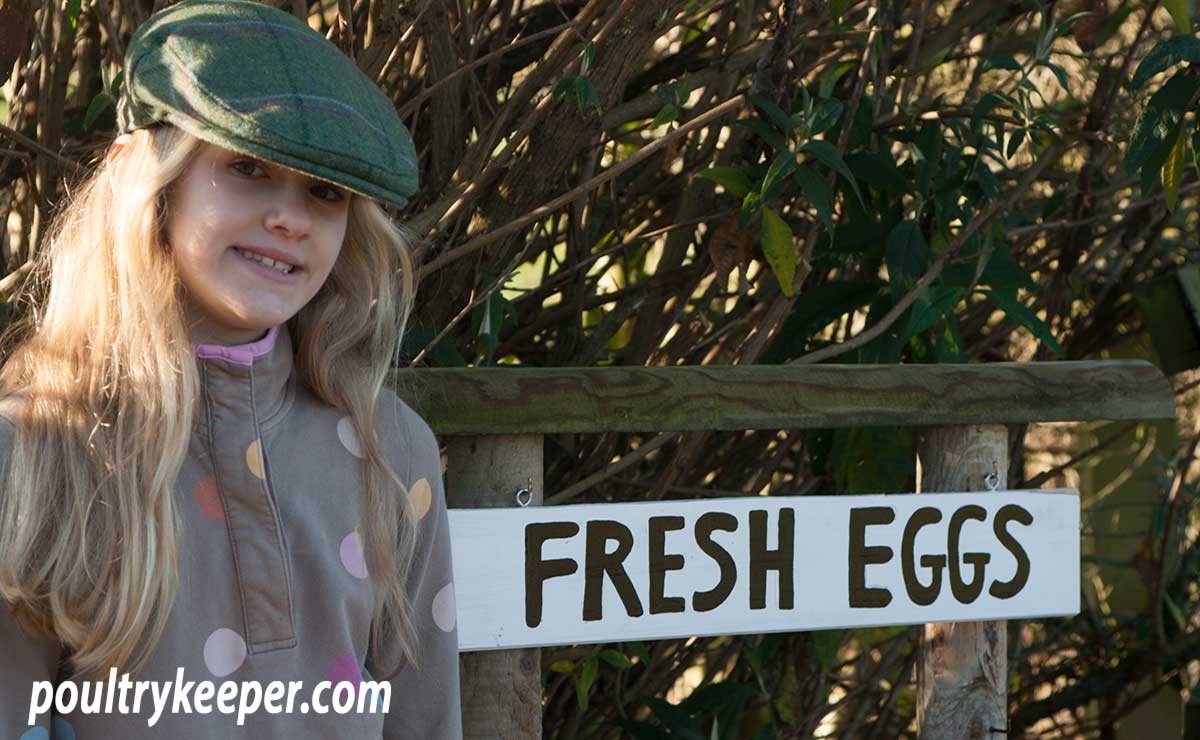
Our chickens are productive pets and will lay a good number of eggs for us, so you may want to sell your surplus eggs at the gate. There are a few rules and regulations to be aware of when selling eggs from backyard hens, and in this article, Andy provides us with some tips to guide us.
An increasing number of people are starting to keep chickens or ducks in their back gardens and ‘backyard hen keeping’ is fast becoming one of the most popular gardening ‘hobbies’ not only in this country but around the globe.
Aside from the campaigns to improve chicken welfare beyond a cheap egg-laying machine, people are now seeing them as more just a source of food. They are filled with character, make a great addition to the productive garden, and fill both the boots of accessible livestock and household pets.
The more people I meet and speak to the more I’m starting to feel that the poultry concept of ‘dual-purpose’ is being challenged and in some folks eyes this no longer means ‘table & laying qualities’ but more ‘productive & pet’.
Let’s face it, how many pets can you name that are happy and content when interacting with humans who are also capable of converting food and unwanted green waste into a nutritional parcel of food every day. Even the waste they produce provides a perfect medium for growing more food!
That said, keeping chickens can be like growing courgettes; they are not difficult to grow and care for but, for the over-eager gardener, what seemed like a measly 4 or 5 plants when you started will be producing more courgettes than you can casserole, and in a glut.
Hens essentially are not that different…. think about it for a moment before you dismiss it.
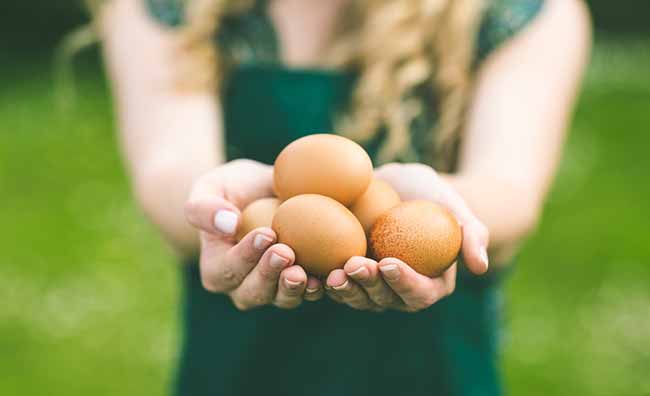
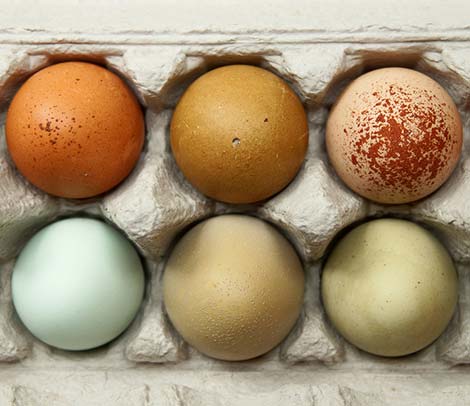
How many surplus eggs will you have?
Six regular hens will produce around 200 eggs each a year (and that’s an under-estimate for some breeds). Like courgettes, this production won’t be spread out throughout the year either as hens will take a break from laying for around two months a year, so that’s 1200 eggs in ten months or in more simple terms around 30 eggs a week. Okay, an egg each a day for the average family of 5 will mean that’s manageable, but it will result in a surplus for most families, so what can you do with all those extra eggs?
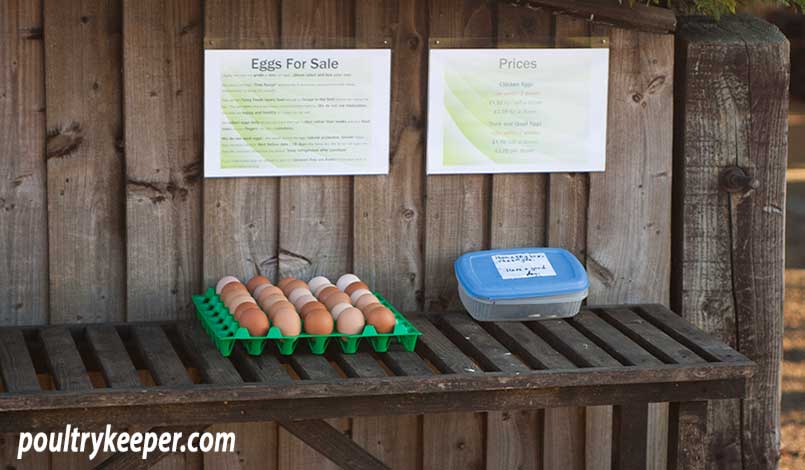
It is possible to preserve eggs for those ‘egg-free’ periods by pickling, freezing for example but the benefit of an egg is its freshness, so why not sell them? It’s not a get rich quick scheme, but it’s certainly a way of helping fund the hens’ upkeep.
Remarkably as it may sound the small expenditure you make in buying your hens could make a return albeit a small one, but “them pennies make pounds” as the saying goes. So what’s the law on selling eggs?
The law on selling eggs
It’s rather complicated if you produce on a commercial-scale, with more than 350 hens, and rightly so, but for the home producer, there are a few ways we can sell our surplus eggs.
You may sell eggs door to door, or, at the gate of your property, and if you have 50 hens or less, at a local market, providing you follow Food Labelling Regulations.
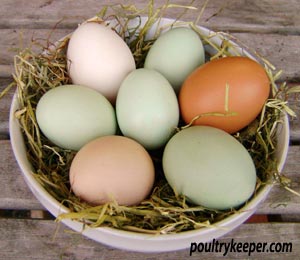
Selling eggs in this way excludes you from most commercial regulations, but there are some restrictions you need to be aware of.
Rules for selling eggs at the gate
The commercial regulation says you will need to register as a producer with an Egg Marketing Inspectorate (EMI) if you:
- Have 350 or more hens or
- Have 50 or more hens and any of your eggs are marketed at local public markets or
- Any of your eggs are marketed to registered packing centres.
If you have less than 350 hens and all the eggs you produce are sold directly to individual consumers at your farm gate or by door-to-door sales you will not need to register as a producer.
To sell your eggs to shops, bakeries, or restaurants, they need to be graded as Class A. To grade eggs, you must be approved and authorised as a packing centre, which prevents us from selling to a local farm shop or supplying a local pub for example without following the commercial rules for selling eggs.
Remember that under different laws on keeping poultry for disease control, if you own 50 or more birds (any poultry species and including chicks and young stock), you will need to register with the GB Poultry Register.
Rules for selling eggs at a local market
& the Food Labelling Regulations
If you sell some of your eggs at local public markets but have less than 50 hens then you will not need to register, but you will need to display labelling required under Food Labelling Regulations which say you need to label your eggs with:
- The name of the food.
- Your name and address.
- The best before date.
- Advice to consumers to keep eggs chilled.
For selling a few eggs at the gate, we still need to follow a few Do’s and Don’ts:
Don't...
- Grade the size of your eggs. You can box them up according to size e.g. large fowl or bantam but you should not state they are large, medium or small, these are commercial terms that require the egg to fit with a regulatory size.
- Try to sell the eggs as "Free Range" or "Organic" despite the fact you might free range, or feed and garden organically. These terms are industry standards and you must comply with them in order to sell your eggs as such. Instead use your imagination should you need to promote your eggs, "Garden Grown, Friendly & Free To Roam" would be a handy side step.

Do...
- Make sure the eggs are clean but not washed. Washing removes the eggs protective 'bloom' can expose it to the risk of bacterial infection. Keep any dirty eggs for yourself. Also check they are not cracked, common sense really, even checkout staff open boxes to check in some shops.
- Give some thought to how you market them. It's surprising how many people prefer to buy their produce "Off Gate" where freshness can be counted in days not weeks, and food miles on fingers and not a calculator.
- Make sure you research prices locally. Selling direct (and not driven by profit) means it's easy to undercut the supermarket prices with all their overheads but do take into consideration the cost of production, e.g. feed. Try to price them so the income makes a contribution to the cost of keeping the hens, they will still be an attractive alternative to retailers.
- Tell your customer a best before date. Eggs will last for up to 28 days from the date of laying if stored correctly so make sure you have some system to date order your produce and ensure your customers know the 'best before' when they buy . Its likely cases you be selling eggs that are only a few days old and that puts then well ahead on freshness versus shop eggs.
- Most of all DO keep a record of what your matronly madams are bringing in, OK it won't pay for Christmas or a holiday but it will put them close to being a self-funding supply of food, and that can't be sniffed at.
There is a good selection of egg boxes for sale here on Amazon.

